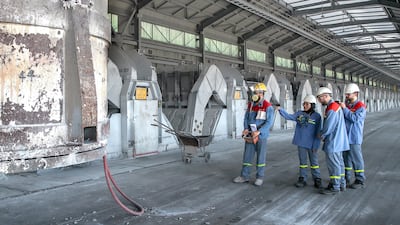Abu Dhabi’s economy grew 3.1 per cent annually in 2023, hitting its highest level in a decade, as a sharp expansion of the non-oil sector drove momentum amid a continuing push for diversification.
The emirate's gross domestic product for the 12 months to the end of December reached Dh1.14 trillion ($310.63 billion), its best performance in terms of value in 10 years despite challenges and global market fluctuations that affected all sectors, Abu Dhabi Media Office said on Monday.
The non-oil economy of Abu Dhabi expanded 9.1 per cent year-on-year for the 12-month period, driven by “significant strides in the construction, finance and insurance, and transportation and storage economic activities” that contributed more than 53 per cent to the total GDP, the media office said, citing Statistics Centre Abu Dhabi (Scad) data.
In the last quarter of the 2023, Abu Dhabi’s economy grew by 4.1 per cent compared to the same period in 2022. The emirate’s non-oil economy achieved 10.4 per cent growth on an annual basis for the same period.
The results reflect the success of Abu Dhabi's strategic policies to boost economic diversification, innovation and entrepreneurship, the media office said.
“The impressive performance of our Falcon Economy during the past few years proved the effectiveness of Abu Dhabi’s proactive approach to address the ever-changing dynamics of the global economy,” said Ahmed Al Zaabi, chairman of the Abu Dhabi Department of Economic Development (Added).
“As evidenced by the exceptional growth of targeted sectors and clusters … which was the highest in the Mena region, Abu Dhabi has reaffirmed its status as a leading, innovative economic powerhouse and magnet for talents, businesses and quality investments.”
Abu Dhabi’s economy has maintained a robust growth momentum since bouncing back from the Covid-driven slowdown. The emirate's GDP grew by 9.3 per cent annually in 2022 to record the highest growth rate in the Mena region last year, exceeding Dh1.1 trillion.
Abu Dhabi is expanding efforts to diversify its non-oil economy and attract investment across sectors including tourism, aviation and technology.
The emirate has continued its shift away from oil and has taken several measures to attract international investors, boost its competitiveness and improve the ease of conducting business.
In 2022, the emirate launched an industrial strategy to boost the contribution of the sector to the economy, by investing Dh10 billion across six programmes to more than double the emirate’s manufacturing to Dh172 billion by 2031.
Abu Dhabi also plans to boost the tourism sector's contribution to its GDP to 12 per cent by 2030, from 5 per cent last year. It has also laid out long-term strategies to further develop sectors including aviation and technology.
The emirate issued 25,647 economic licences last year, an annual increase of 3.5 per cent, with the newly licensed companies' total capital exceeding Dh210.7 billion, according to the Business Activity Report issued by Added in January.
The latest Scad data showed robust growth in the construction sector, which grew by 13.1 per cent, with the added value of the sector reaching more than Dh97 billion, the highest in a decade. The sector contributed 8.5 per cent to Abu Dhabi's total GDP.
The added value of manufacturing activities last year hit Dh101 billion, representing 8.8 per cent of GDP, and was the biggest non-oil contributor to economic growth in 2023, according to the Scad data.
Financial and insurance sector activity recorded the biggest percentage growth, expanding by 25.5 per cent, with their value reaching Dh79 billion, reflecting the "growing confidence of the international community in the emirate’s economy", Scad added.
Wholesale and retail trade activity expanded by 7.9 per cent last year and with Dh63 billion in value, it accounted for 5.5 per cent of the emirate’s GDP, according to preliminary data.
Transport and storage activity grew by 17.1 per cent, both health and education sectors grew 5.5 per cent, while the real estate sector expanded by 5.8 per cent during the same period.


